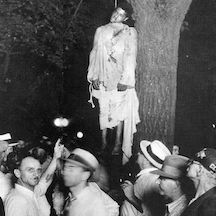 A new study lead by researchers at the University of South Carolina finds that counties where lynchings occurred between 1877 and 1950 have higher rates of mortality today than counties where no lynchings occurred.
A new study lead by researchers at the University of South Carolina finds that counties where lynchings occurred between 1877 and 1950 have higher rates of mortality today than counties where no lynchings occurred.
Researchers examined mortality rates in 1,221 counties in 12 southern states and then compared this information with historical data on lynchings by county. They found that in counties that had lynchings, mortality rates were higher for both Blacks and Whites. The study estimates that living in a high-lynching county is associated with 34.9 additional deaths per hundred thousand per year for White males, 23.7 deaths for White females, and 31 deaths for African American females. African American male death rates today were not significantly higher in high lynching counties compared to counties where no lynchings occurred.
“While White mortality rates were still consistently lower than those of their African American counterparts, this relative advantage was somewhat lessened by living in a county with a history of racial violence,” explains lead author Janice Probst, who is still perplexed by the link between historic lynching and White mortality. “This means that while being the target of race-based bias is the more severe condition, bias also has a cost for the dominant population.”
The full study, “Strange Harvest: a Cross-sectional Ecological Analysis of the Population Ratio Between Historic Lynching Events and 2010-2014 County Mortality Rates” was published in Journal of Racial and Ethnic Health Disparities. It may be accessed here.










Jah and Jahnes love. Thanks for sharing the findings from this study. I think that it is really important to remember that hate is a negative feeling and it can generate illness within the body. More than that, folks who commit violent crimes on innocent people should remember that “what goes around, comes around!” Blessed love.
I want to know the name of the man lynched in this picture!
and the family name if the tattooed man pointing in the foreground.
That was an event known as The lynching of Thomas Shipp and Abram Smith